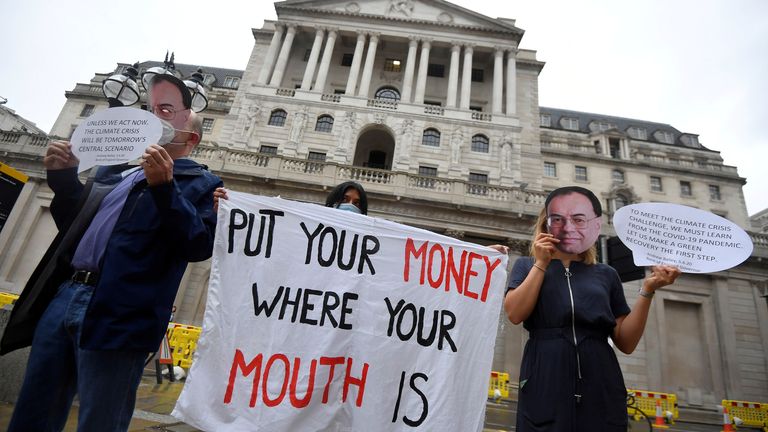Projects funded by UK financial institutions are responsible for 1.8 times the carbon emissions of Britain’s annual net total, a new report has suggested.
The study, commissioned by Greenpeace and WWF, estimated that major UK banks and asset managers were responsible for 805 million tonnes of emissions in 2019, stemming from loans and investments in areas such as energy and industry, and from mortgages, making sector the ninth largest emitter in the world if it were a country.
In the same year the entire UK’s net emissions were 455 million tonnes of CO2.
Tanya Steele, chief executive of WWF UK, said many British citizens would be “alarmed” to learn their money was “all too often” being used in ways that damaged the environment, driving “fossil fuel extraction, deforestation and other destructive activities”.
“This means that money intended for a brighter future may actually be putting our planet in peril,” she told Sky News in a statement.
Charlie Kronick, climate finance adviser to Greenpeace UK said “poll after poll” showed the British public “wanted the country to lead the world in tackling climate change“, and yet many would be “shocked to learn that UK banks and asset managers [were] responsible for these enormous carbon emissions”.
But a spokesperson for UK Finance, which represents 300 banking and finance firms, said lenders took “very seriously” their responsibility to wider society.
They said they were “playing a leading role in the shift to net zero finance”, pointing to a recent commitment by the UK’s six largest banking groups to bring emissions from their portfolios to net-zero by 2050.
But campaigners say many such pledges have been “exposed as greenwash”, which is why they are now calling on government to regulate the financial sector in the same way as other high carbon industries.
They say this would help bring the industry in line with government and international targets to lower emissions and avoid global warming beyond 1.5 degrees.
A government spokesperson said it was “harnessing the power of the financial system” to help reach it’s net zero by 2050 target.
“That includes making climate disclosures mandatory across the economy by 2025, requiring our financial regulators to take our net zero commitment into account, announcing plans for the UK’s first ever green bond and setting up a UK Infrastructure Bank which will unlock investment in the transition to net zero.”
South Pole, which carried out the analysis, assessed the carbon emissions associated with lending and investment of an “indicative sample” of fifteen banks and ten asset managers.
In order to keep global temperatures at no more than 1.5C above pre-industrial levels and avoid further damage from climate change, we must reduce carbon dioxide emissions by about 45% from 2010 levels by 2030, according to the Intergovernmental Panel on Climate Change (IPCC).
But since countries including the UK signed up to the 1.5C goal in the Paris Agreement in 2015, the world’s 60 largest banks have provided £2.7 trillion to the fossil fuel industry, according to Rainforest Action Network.
Sky News has launched the first daily prime time news show dedicated to climate change.
The Daily Climate Show is broadcast at 6.30pm and 9.30pm Monday to Friday on Sky News, the Sky News website and app, on YouTube and Twitter.
Hosted by Anna Jones, it follows Sky News correspondents as they investigate how global warming is changing our landscape and how we all live our lives.



